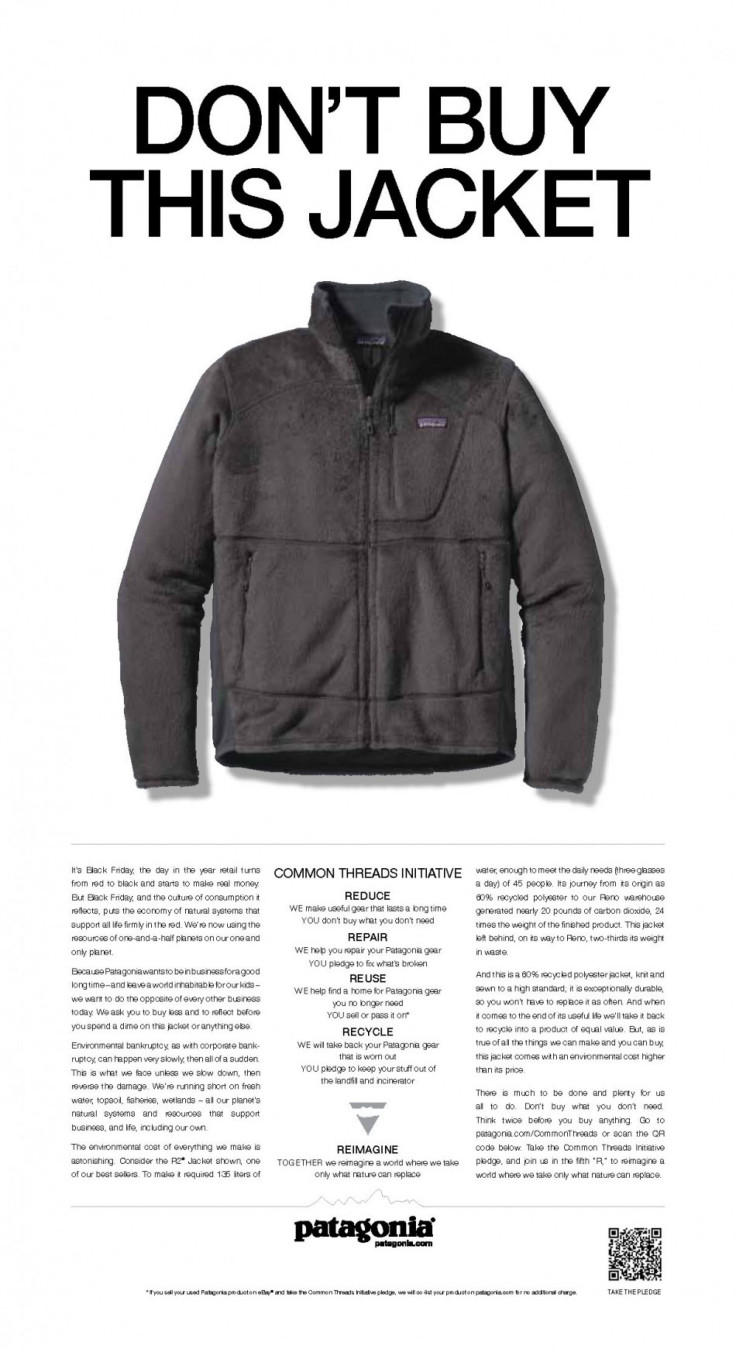Patagonia Tells Customers 'Don't Buy This Jacket' in Unconventional Black Friday, Cyber Monday Ad

Most retailers lured shoppers to their online and brick-and-mortar stores this Black Friday and Cyber Monday with ads promising deals that were too good to pass up.
But outerwear retailer Patagonia effectively tried to do the opposite. It tried to lure shoppers away.
Don't buy this jacket, Patagonia's Black Friday and Cyber Monday ad reads. The company took out a full-page ad in The New York Times on Friday and sent an email to about 750,000 subscribers Monday with the ad embedded. In the ad, Patagonia features one of its best-selling jackets, the R2.
The aim was to draw attention to Patagonia's Common Threads initiative, which advocates against the overconsumption of Black Friday and asks shoppers to only buy what they need.
We can't solve the environmental problem on our own, Christina Speed, Patagonia's marketing director, told IBTimes in a phone interview Tuesday afternoon. We are a business. We want to grow. The awareness level of what everything really costs is really our goal.
According to Patagonia's email to its customers, the R2 jacket requires 135 liters of water, which it said was equal to the daily needs of 45 people. The ad also points out that that the jacket leaves behind two-thirds of its weight in waste, and generates nearly 20 pounds of carbon dioxide in its transportation form factory to warehouse.
We had a bunch of products up there, Speed said of the decision to include the top-selling R2 jacket in the company's ad. We thought it would just be bold enough if we put a bestseller in the final ad. We wanted to make sure it was something that was really valuable to us as a business, and how much strain it put on the environment.
Besides the add in the Times and the email, Patagonia also promoted its stance through a blog post on its Web site and through an op-ed piece by Rick Ridgeway, its vice president of environmental initiatives, in The Los Angeles Times.
But the ad did lead to some criticism from blogs and on Twitter, some of which called Patagonia hypocritical. Others noted the fact that nothing actually prevented customers from purchasing the jacket. But Speed said most of the reaction sent to the company and on Twitter was positive.
Whenever we do something crazy, we get both the negative and the positive, Speed said. And we're happy to open that kind of dialogue. ... If someone pays attention at all, I think they'd have a hard time calling us hypocrites.
For years, Speed said, Patagonia has considered the idea of closing brick-and-mortar stores or halting sales on its Web site on Black Friday and, more recently, Cyber Monday.
But that's usually where the company reaches its comfort threshold.
We don't want to promote not making money. We're a business, Speed said. We put that ad out there to raise awareness about small steps that can make a huge difference.
You don't have to martyr yourself to change the world, we think, in this case. We're not promoting an end to business. We think business is one of the most powerful tools for change. We prove nothing if we're not successful.
Patagonia's ad encourages customers to take a pledge to reduce their environmental footprint. It stresses five R words -- reduce, repair, reuse, recycle and reimagine.
Speed said the company could not promote any of those ideas if the company was not successful.
Who's going to listen to us if we're not profitable?
© Copyright IBTimes 2025. All rights reserved.





















